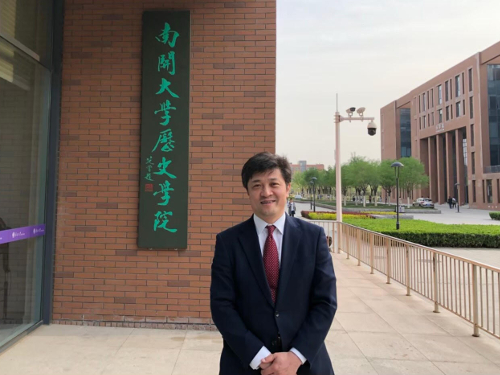
Full Text
簡体字 / 正體字 / English摘要:
本文阐明了面对尼克松冲击,国府如何进行危机处理与推动政治改革,结论可归纳为以下数点。
第一是国府将危机处理的重点放在国内宣传。中美靠拢的过程完全由中美两国主导,台湾处于被动状态,因此基辛格访中时带给台湾相当大的冲击。然而1970年代初期台湾严格限制民众出国,国外的消息也不易传入,国内媒体较为容易操纵信息,因此其后的控管报导也相对“成功”。与时代悖逆的国府控管报导之所以能“成功”,存在一些客观性的因素。虽然国府承受了基辛格秘密访中后的声明所带来的冲击,但是丧失联合国代表权以及尼克松访中对台湾的影响并不大。,中美靠拢并未导致华美断交,更重要的是华美军事关系仍旧持续。尼克松冲击发生之际,蒋介石与毛泽东仍在世,大家多视其为冷战的延长,对1950年代白色恐怖记忆犹新的台湾民众,是不可能在台湾内部对国府展开抗争运动。与此对照的是在1979年中美建交,即华美断交之后,台湾发生了混乱。华美断交的同时,邓小平提出了改革开放政策,当时蒋介石与毛泽东皆已去世,因此华美断交也开启了新时代的序幕。
第二是尼克松冲击加速了台湾内部的政治改革。国民党以外省人为主体,因此全面推动改选中央民意代表机构,意即决心推动民主化有其难度,亦很难彻底改变与中华人民共和国的关系,也无法阻止中美靠拢并挽留美国。虽然曾出现实施增额选举的构想,但诚如本文所述,国府政权是在失去联合国代表权之后才加速实施改革。若没有像尼克松冲击这样的外部震撼,是很难促成这些改革。比起因为对手而难以推行的对外政策,在尼克松访中前后的中常会纪录里,更多的是与内政改革相关的内容。增额选举从1972年底起到1989年为止定期举办,以地方自治选举为基础而举行的限定性中央层级选举,淡化了国民党对选举的恐惧,并减少了日后推动民主化时发生障碍的作用。
第三是加速推动政治改革,替蒋经国的执政铺路。1972年3月,蒋介石五连任总统,5月蒋经国就任行政院长。然而蒋介石实际上是万年总统,行政院长严家淦变成虚位的副总统,实权则掌握在担任行政院长的蒋经国手中。“青年才俊”政策表面上是降低年龄层的改革,实际上是让蒋介石的部下退职,企图世代交替,也就是蒋经国一方面让高龄85且体弱的独裁者父亲五连任总统,一方面为加强自身权力,强行立法增加政治酬庸的职位,将自己的追随者快速安插在政府组织中。“青年才俊”政策是借着外交危机与领导层高龄化,巧妙利用社会封闭性而进行的政治性议题操作。可谓蒋经国将起因于尼克松冲击的体制危机,转化为巩固自身权力基盘的力量。
摘要:
本文闡明了面對尼克森衝擊,國府如何進行危機處理與推動政治改革,結論可歸納為以下數點。
第一是國府將危機處理的重點放在國內宣傳。中美靠攏的過程完全由中美兩國主導,台灣處於被動狀態,因此季辛吉訪中時帶給台灣相當大的衝擊。然而1970年代初期台灣嚴格限制民眾出國,國外的消息也不易傳入,國內媒體較為容易操縱資訊,因此其後的控管報導也相對「成功」。與時代悖逆的國府控管報導之所以能「成功」,存在一些客觀性的因素。雖然國府承受了季辛吉秘密訪中後的聲明所帶來的衝擊,但是喪失聯合國代表權以及尼克森訪中對台灣的影響並不大。,中美靠攏並未導致華美斷交,更重要的是華美軍事關係仍舊持續。尼克森衝擊發生之際,蔣介石與毛澤東仍在世,大家多視其為冷戰的延長,對1950年代白色恐怖記憶猶新的台灣民眾,是不可能在台灣內部對國府展開抗爭運動。與此對照的是在1979年中美建交,即華美斷交之後,台灣發生了混亂。華美斷交的同時,鄧小平提出了改革開放政策,當時蔣介石與毛澤東皆已去世,因此華美斷交也開啟了新時代的序幕。
第二是尼克森衝擊加速了台灣內部的政治改革。國民黨以外省人為主體,因此全面推動改選中央民意代表機構,意即決心推動民主化有其難度,亦很難徹底改變與中華人民共和國的關係,也無法阻止中美靠攏並挽留美國。雖然曾出現實施增額選舉的構想,但誠如本文所述,國府政權是在失去聯合國代表權之後才加速實施改革。若沒有像尼克森衝擊這樣的外部震撼,是很難促成這些改革。比起因為對手而難以推行的對外政策,在尼克森訪中前後的中常會紀錄裡,更多的是與內政改革相關的內容。增額選舉從1972年底起到1989年為止定期舉辦,以地方自治選舉為基礎而舉行的限定性中央層級選舉,淡化了國民黨對選舉的恐懼,並減少了日後推動民主化時發生障礙的作用。
第三是加速推動政治改革,替蔣經國的執政鋪路。1972年3月,蔣介石五連任總統,5月蔣經國就任行政院長。然而蔣介石實際上是萬年總統,行政院長嚴家淦變成虛位的副總統,實權則掌握在擔任行政院長的蔣經國手中。「青年才俊」政策表面上是降低年齡層的改革,實際上是讓蔣介石的部下退職,企圖世代交替,也就是蔣經國一方面讓高齡85且體弱的獨裁者父親五連任總統,一方面為加強自身權力,強行立法增加政治酬庸的職位,將自己的追隨者快速安插在政府組織中。「青年才俊」政策是藉著外交危機與領導層高齡化,巧妙利用社會封閉性而進行的政治性議題操作。可謂蔣經國將起因於尼克森衝擊的體制危機,轉化為鞏固自身權力基盤的力量。
Abstract:
There is an enduring relationship between external political crises and domestic political action. This paper examines the case of Taiwanese political reforms in response to the Nixon Shocks of the early 1970s. The history of Taiwanese political development is complex. Here, I attempt to shed light on one particularly formative period of the long road to democracy.
The Nixon Shocks had a profound effect on Taiwanese political reform, yet not in the manner that much theory might predict. Typically, adverse external political-security shocks tend to cause domestic political-government centralization. In Taiwan, it was different: the Nixon Shocks resulted in pseudo-liberal political reform. I argue that three interacting forces explain this outcome: authoritarian media control, external threat to national legitimacy, and Chiang Ching-kuo strategic rise to power. Together, they resulted in what may be termed a ‘liberal-authoritarian consolidation of power’.
The ROC government maintained absolute control over domestic media during the crisis. It focused on domestic propaganda and censorship and was very successful in managing the domestic public narrative surrounding the Nixon Shocks. This meant that citizen objection and protests against the government were virtually non-existent. Through this authoritarian control of the press, the ROC was able to secure political expediency in responding to the crisis.
At the same time, however, the ROC faced a severe threat to legitimacy from abroad, as the Nixon Shocks led to a loss of United Nations membership in 1971. The ROC government thus sought ways to increase both international and domestic legitimacy. Liberalizing the political system served both of these ends in that doing so better aligned with the norms of foreign sponsors in the West and provided a measure of citizen empowerment at home.
Finally, President Chiang Kai-shek’s health was fading and his ability to meet such kinds of complex challenges was waning. Animated policy adaptation was needed, yet the government was filled with his old guard and staunch allies, many of whom were resistant to change. His son, Chiang Ching-kuo, sought to ascend to his father’s role as “supreme leader,” and political reform was an instrument to do so.
Thus, elements of authoritarianism, threats to legitimacy, and tactics of domestic power transition came together to enable and cause political reform in Taiwan in the wake of the Nixon Shocks. This occurred despite deep-rooted resistance within the government and Parliament and at the expense of vested interests, as Chiang Ching-kuo rose to the seat of power on the wings of political reform.